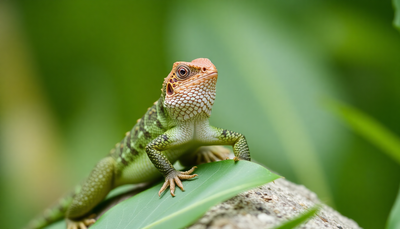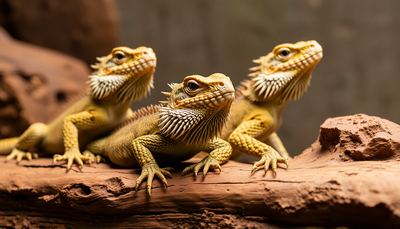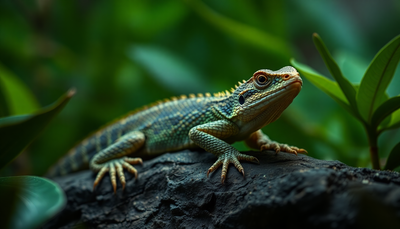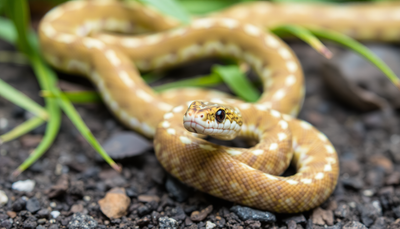Key Takeaways:
- Introduction
- Understanding Reptile Dietary Needs
- Top Brands for Nutritious Reptile Food
- Essential Accessories for Reptile Care
- Evaluating Product Quality and Ingredients
- Maintaining a Balanced Feeding Schedule
- Resources for Further Research
Understanding the Importance of Proper Nutrition and Accessories for Your Reptile
The Foundation of Reptile Health
Providing your reptile with the right nutrition is not just a matter of preference; it is essential for their overall health and well-being. Reptiles, like all animals, require a balanced diet tailored to their specific species. This includes the right proportions of proteins, vitamins, and minerals. A deficient diet can lead to serious health problems, including metabolic bone disease, lethargy, and even premature death. Understanding your reptile's dietary needs is the first step towards fostering a long and healthy life.
Essential Accessories for Optimal Living Conditions
In addition to a nutritious diet, the right accessories play a pivotal role in creating a comfortable environment for your reptile. Items such as heat sources, UV lighting, and appropriate substrate are critical in mimicking their natural habitat. For example, UVB lighting is essential for many reptiles as it helps them synthesize vitamin D3, which is crucial for calcium absorption. Without these accessories, even the best diet can fall short, leading to health complications.
Balanced Diets: Live Food vs. Commercial Options
When it comes to reptile food, there are a variety of choices, including live prey and commercial diets. While live food can provide natural nutrients and stimulate hunting instincts, commercial options often come packed with essential vitamins and minerals, ensuring proper nutrition for your pet. It's important to research which diet works best for your specific type of reptile, as some thrive on one type of food over another. Always consult with a veterinarian who specializes in reptiles to make informed choices.
Impact of Stress on Nutrition
Stress can significantly impact a reptile’s ability to eat and digest food properly. Proper housing, environmental setup, and access to the right accessories contribute to a calm and secure atmosphere. This means ensuring an appropriate temperature gradient, hiding spots, and minimal disruptions. A stress-free environment not only enhances the reptile’s appetite but also aids in digestion, directly influencing their overall health.
Monitoring Nutritional Health
Finally, regularly monitoring your reptile’s health and weight is crucial in ensuring they are receiving proper nutrition. Look for signs of healthy activity and engagement, such as regular shedding and energy levels. In cases of doubt or concerns about dietary needs, don’t hesitate to consult a veterinarian specializing in reptile care. They can provide tailored advice based on your pet's specific species and health conditions.
Ultimately, understanding the importance of both nutrition and accessories can make a significant difference in your reptile's quality of life. By investing time and effort into understanding these needs, you create a nurturing environment that keeps your pet content and healthy.
Understanding Reptile Dietary Needs
Herbivores: The Plant-Loving Reptiles
Herbivorous reptiles, such as tortoises and some species of iguana, primarily thrive on a diet consisting of vegetation. These reptiles require a variety of greens, fruits, and vegetables to obtain essential vitamins and minerals. It’s crucial to provide a well-balanced selection to ensure adequate fiber intake, which supports healthy digestion. This is particularly important as herbivores are more prone to gastrointestinal issues if their diet is unbalanced.
"A balanced plant-based diet can significantly improve the health and longevity of your herbivorous reptiles." – Reptile Nutrition Expert
Carnivores: The Meat-Eaters
Carnivorous reptiles, such as snakes and certain geckos, rely heavily on protein from animal sources for their nutritional needs. Their diet may include insects, small mammals, and even fish, depending on the species. It’s vital to ensure their diet is rich in protein while also providing essential fatty acids and vitamins. Supplementation is often necessary, especially in captive environments, to mimic the nutritional quality of their natural prey.
"Without proper nutrition, carnivorous reptiles can experience serious health issues, including metabolic bone disease." – Dr. Jane Smith, Reptile Veterinarian
Omnivores: The Versatile Eaters
Omnivorous reptiles, like many lizards and turtles, exhibit a diverse diet that includes both plant and animal matter. This adaptability allows them to thrive in various environments, and it also means that their diet should feature a mix of greens, fruits, and proteins. Maintaining a balanced omnivorous diet is crucial for these reptiles to prevent deficiencies and ensure optimal health.
The Importance of a Balanced Diet
Regardless of their dietary classification, all reptiles require a balanced diet to maintain their health. A proper nutritional balance helps to ensure robust immune function, proper growth, and overall vitality. Supplements, such as calcium and vitamin D3, are often necessary, particularly for species that do not receive adequate UVB light. A diet that lacks essential nutrients can lead to serious health problems, including metabolic disorders and a shortened lifespan.
Understanding the unique dietary needs of each species is vital for any reptile owner. Regularly monitoring and adjusting their diet as needed will not only improve their well-being but also enhance their quality of life.
Top Brands for Nutritious Reptile Food
1. Repashy Super Foods
Repashy Super Foods is a brand renowned for its high-quality, nutritious reptile food. Their products contain a balanced mix of proteins, vitamins, and minerals, ensuring optimal health for reptiles. One of the standout features of Repashy is its commitment to ingredient transparency, providing detailed information about their sourcing and production methods. This allows pet owners to make informed choices about what they feed their reptiles.
2. Zoo Med
Zoo Med is another reputable brand that prioritizes nutrition. Known for their diverse range of products, Zoo Med offers specialized diets tailored to various reptile species. Their foods are rich in essential nutrients and fortified with vitamins to address the unique dietary needs of reptiles. Moreover, they adhere to strict sustainability practices, ensuring environmentally responsible sourcing.
3. Exo Terra
Exo Terra provides a variety of nutritious insect-based diets and live food options that replicate the natural meals of reptiles in the wild. Their focus on natural ingredients allows for healthier dietary options, supporting the well-being of reptiles. Exo Terra is known for utilizing eco-friendly packaging, demonstrating a commitment to sustainability that resonates with environmentally conscious pet owners.
4. Fluker's Crickets
Fluker's Crickets offers a unique approach with their specialty in live feeders, particularly crickets. This brand stands out for its commitment to quality assurance, ensuring that their live food is raised in clean, nutrient-rich environments. Fluker's emphasizes the importance of providing reptiles with live food to enhance their natural hunting instincts while ensuring high nutritional value.
5. Mazuri
Mazuri is well-known in the exotic animal food industry, providing scientifically formulated diets for a variety of exotic pets, including reptiles. Their products feature specific nutrient profiles tailored to the needs of different species. With a focus on research-backed formulations, Mazuri ensures that each product supports the health and vitality of reptiles throughout their lives.
Nutritional Value Comparison Table
| Brand | Key Nutritional Highlights | Ingredient Transparency | Sustainability Practices |
|---|---|---|---|
| Repashy Super Foods | High protein, low fat | Detailed ingredient sourcing | Eco-friendly packaging |
| Zoo Med | Fortified with vitamins | Clear labeling | Responsible sourcing |
| Exo Terra | Insect-based diets | Natural ingredient focus | Recyclable packaging |
| Fluker's Crickets | High protein content | Quality assurance protocols | Farm-raised sustainability |
| Mazuri | Research-backed formulations | Species-specific diets | Ethical ingredient sourcing |
Choosing the right nutritious reptile food is crucial for the health and happiness of your pet. By selecting reputable brands such as those highlighted above, pet owners can ensure they are providing the best possible nutrition while also supporting sustainable practices in the pet food industry. If you have any personal preferences or experiences with these brands, feel free to share your thoughts in the comments below!
Essential Accessories for Reptile Care
Creating the perfect environment for your reptile companions involves more than just providing nutritious food. It's crucial to equip their habitat with the right accessories that ensure their health and happiness. Let’s delve into the critical accessories that will enhance the habitat and well-being of your reptiles, focusing on heating, lighting, humidity control products, and enrichment tools.
Heating Solutions
Reptiles are ectothermic creatures, meaning they rely on external heat sources to regulate their body temperature. Maintaining the right temperature gradient in their habitat is essential. High-quality heat lamps and under-tank heaters provide a safe way to create basking spots where reptiles can absorb warmth. Make sure to monitor temperatures regularly using a reliable thermometer.
"The right heating solutions can make all the difference in a reptile's health and behavior." – Herpetologist Dr. Jane Smith
Lighting Essentials
Proper lighting is another critical factor for your reptile's habitat. Most reptiles require UVB lighting to help them synthesize vitamin D3, a vital nutrient for calcium absorption. Without adequate UVB exposure, reptiles can develop serious health issues. Choose a UVB bulb specifically designed for reptiles, and ensure it's positioned well within their habitat to maximize exposure.
Humidity Control Products
Different species of reptiles have varying humidity requirements. Using humidity gauges can help you monitor the moisture levels in their environment. To maintain optimal humidity, consider incorporating misting systems, water bowls, and even live plants that naturally help regulate moisture. Keeping the right humidity ensures your reptiles stay hydrated and healthy.
Enrichment Tools
Providing mental stimulation is just as important as meeting physical needs. Enrichment tools such as climbing branches, hides, and substrate for burrowing can significantly enhance your reptile's quality of life. Include a variety of textures and structures for them to explore, which also encourages natural behaviors, reducing stress and boredom.
"Enrichment is not just a luxury; it’s essential for the psychological health of reptiles." – Reptile Behavioral Specialist Tom Green
Incorporating these essential accessories into your reptile's enclosure will greatly contribute to their overall thriving and well-being. Always remember that each reptile species has unique needs, so tailor these recommendations to suit your specific pets. Engaging with your reptiles by enhancing their habitat ultimately fosters a happier, healthier companion.
Evaluating Product Quality and Ingredients
When it comes to providing a healthy diet for your reptiles, evaluating product quality is essential. As we continue our journey through the landscape of nutritious reptile food and essential accessories, let's delve into how to read labels and assess the overall quality of what you're purchasing. Understanding these details can significantly impact your pet's health and wellbeing.
Understanding Ingredients Lists
Every package of reptile food includes an ingredients list, and it's crucial to understand what you're looking at. Aim for products that feature high-quality natural ingredients right at the top of the list. Ingredients are listed in order of weight, so if a specific protein source, like chicken meal or fish meal, is named first, it indicates that it's a primary component of the food. Avoid products where grains or fillers are listed as the primary ingredients.
Identifying Harmful Additives
Reading labels also means being vigilant about harmful additives. Ingredients such as artificial colors, preservatives, and sweeteners can be detrimental to your reptile's health. Harmful preservatives like BHA (butylated hydroxyanisole) and BHT (butylated hydroxytoluene) should be avoided. Choose brands that stick to natural preserving methods or none at all. If you are unsure about any ingredient, consider doing quick online research to learn more.
The Importance of Nutritional Balance
Nutritional balance is vital for the overall health of your reptiles. Look for products that state their nutritional content clearly. High-quality reptile diets usually list their protein, fat, and fiber percentages prominently. Aim for a diet that aligns with your reptile's specific needs—an omnivore might benefit from a diet with higher protein content, while herbivorous reptiles might need more fiber.
Comparing Brands and Products
Taking the time to compare between various brands enables you to make informed decisions. Below is a comparison table summarizing key factors you should consider when evaluating reptile food brands:
| Brand | Main Ingredients | Harmful Additives | Nutritional Balance |
|---|---|---|---|
| Brand A | Chicken Meal, Plant Protein | No | High Protein, Low Fat |
| Brand B | Fish Meal, Vegetables | Yes (BHA) | Moderate Protein, High Fiber |
| Brand C | Lamb, Rice | No | High Protein, Moderate Fat |
This table summarizes key features that can help you determine which brands provide the best value and quality. Remember that investing in high-quality reptile food and accessories ensures your pet thrives, enhancing their well-being and longevity.
Final Thoughts
As you navigate through the bustling marketplace for reptile food, making informed decisions based on label evaluation and quality assessment is paramount. By prioritizing natural ingredients and steering clear of harmful additives, you provide your reptiles with the best chances for a happy and healthy life.
Have any other tips to share? Please leave your thoughts and experiences in the comments below—we'd love to hear from you!
Maintaining a Balanced Feeding Schedule
In the journey of reptile care, establishing a consistent feeding schedule is paramount. Different species of reptiles have varying dietary needs, and understanding these requirements is crucial to their health and well-being. Moreover, a well-maintained schedule not only promotes optimal health but also helps avoid the dangers associated with overfeeding, a common mistake among reptile owners.
Understanding Dietary Needs
Every reptile species has its unique dietary preferences and nutritional requirements, influenced by factors such as age, size, and natural habitat. Establishing a feeding schedule requires a keen awareness of these dietary needs. Here are some critical considerations:
- Species-Specific Diets: Research the specific dietary guidelines for your reptile species, as some may require a herbivorous diet, while others thrive on insects or small mammals.
- Age and Size: Juvenile reptiles often need more frequent feedings compared to adults due to their rapid growth rates. Adjust the feeding schedule accordingly.
- Seasonal Variations: Some species may enter brumation or estivation during certain times of the year; understanding these cycles will aid in adjusting their feeding schedule to maintain their health.
Creating a Feeding Routine
Establishing a consistent feeding routine helps in monitoring your reptile's eating habits and health. Consider the following approaches to develop an effective schedule:
- Same Time, Same Place: Feed your reptiles at the same time and place daily or weekly. This routine helps them adjust and look forward to feeding times.
- Portion Control: Measure food portions accurately based on your reptile's size and dietary needs, helping to prevent overfeeding.
- Observation: Monitor how much food is consumed each feeding. Adjust the portion sizes based on their actual intake to reduce waste and regulate their diet.
Avoiding Overfeeding
Overfeeding is one of the most frequent mistakes reptile owners make, leading to serious health issues such as obesity and metabolic disorders. Here are some tips to help avoid this pitfall:
- Recognize Signs of Overfeeding: Watch for weight gain, lethargy, or changes in behavior, as these may indicate overfeeding.
- Utilize Feeding Guides: Refer to species-specific feeding guides that outline appropriate portion sizes and frequency.
- Avoid Free-Food Habits: Resist the temptation to leave food in the enclosure, as reptiles are instinctively greedy eaters and may consume more than they need.
By establishing and maintaining a thoughtful feeding schedule, you not only cater to the dietary requirements of your reptile but also enhance their overall health and longevity. Remember, a well-fed reptile is a happy and healthy reptile!
Resources for Further Research
Trusted Websites
To enhance your understanding of reptile nutrition and essential care accessories, several reputable websites offer a wealth of information. Websites like Reptiles Magazine provide insights into various species, feeding guidelines, and habitat maintenance tips. Additionally, The Rainforest Site hosts articles on sustainable practices for habitat care, which can be beneficial for both owners and the environment. Engaging with these platforms will keep you informed about the latest best practices in reptile care.
Essential Books
Books remain an invaluable resource for any reptile enthusiast. Titles like The Reptile Care Manual by Dr. Allen H. F. N. Swanson offer comprehensive guidance on species-specific nutrition and care methods. Another highly regarded book is Complete Leathery Turtle by Eric M. K. Becker, which delves into the dietary needs and environmental requirements of various turtle species. Investing time in these resources can significantly enhance your understanding of the nutrition required for your reptiles to thrive.
Engaging Forums and Communities
Joining online forums is an excellent way to connect with fellow reptile enthusiasts. Websites like Reptile Forums and r/reptiles on Reddit serve as bustling communities where members share experiences, advice, and recommendations on reptile food and accessory purchases. Engaging in discussions can provide practical insights that are often rooted in real-life experiences, making them particularly valuable.
Veterinary Resources
Consulting a veterinarian specializing in reptiles can offer tailored recommendations based on your pet's needs. Websites like AVMA (American Veterinary Medical Association) provide directories to locate qualified professionals. Many veterinarians also share articles or tips on their blogs, focusing on reptile health and diet. Regular consultations will help ensure that your beloved reptiles are receiving optimal care.
YouTube Channels and Podcasts
Visual and auditory learners can benefit from several YouTube channels and podcasts dedicated to reptile care. Channels such as The Reptile Room provide engaging, informative videos on nutrition and habitat setup. Podcasts like The Kingsnake Blog offer discussions on various topics affecting reptile care. These formats provide a dynamic way to gather knowledge and tips while enjoying your favorite reptile topics.
By exploring these resources, you can significantly elevate your reptilian knowledge, ensuring your pets receive the care they deserve. Don’t forget to engage in community discussions and share your findings with fellow reptile lovers!
Conclusion
In summary, choosing the right brands for nutritious reptile food and essential accessories is crucial for the well-being of your beloved pets. It is not just about providing sustenance, but also about ensuring optimal health and longevity for your reptiles. The brands we've covered offer a range of products that cater to the dietary needs of different species, along with accessories that promote a safe and enriching environment.
As a responsible reptile owner, investing in high-quality food and accessories can immensely impact your pet's quality of life. Remember, a healthy reptile is a happy reptile! Take the time to research and select products that align with your pet's unique needs, considering both their species and individual preferences.
Before you choose, reflect on the considerations we've discussed: ingredient quality, nutritional balance, and the reputation of the brands. By doing so, you're not only ensuring their personal well-being but also contributing to a healthier ecosystem overall.
Now it's your turn! Explore the various options available, consider trying out one of the recommended brands, and observe the improvements in your reptile's health and happiness. Your commitment to their care can lead to a rewarding and fulfilling bond.
What changes will you make in your reptile care routine? Share your thoughts in the comments below and let us know how these brands have influenced your pet's lifestyle!
FAQs
What is SEO and why is it important?
SEO, or Search Engine Optimization, is the practice of enhancing a website to improve its visibility on search engines. Higher visibility leads to increased organic traffic, which is essential for business growth and online presence.
How long does it take to see results from SEO?
Results from SEO strategies can vary based on factors such as competition, industry, and the current state of your website. Typically, noticeable improvements can be expected within three to six months, but ongoing efforts are crucial for sustained success.
What are the main components of SEO?
The main components of SEO include on-page optimization (like keyword usage and content quality), off-page optimization (such as backlinks), and technical SEO (which involves website performance and indexing).
Are there free tools available for SEO?
Yes, there are several free tools available for SEO such as Google Analytics, Google Search Console, and Ubersuggest. These tools help analyze traffic, monitor website performance, and find keyword opportunities.
How often should I update my website’s content?
It's advisable to update your website's content regularly, ideally on a monthly basis. Fresh content keeps your audience engaged and signals to search engines that your site is active, which can help with SEO rankings.
What is the role of keywords in SEO?
Keywords are crucial in SEO as they connect search queries to your content. Researching and strategically using relevant keywords help improve your website’s visibility and attract the right audience.
Can social media impact SEO?
Yes, social media can indirectly impact SEO. While social signals themselves are not direct ranking factors, sharing content on social platforms can increase its visibility and lead to more inbound links, enhancing overall SEO performance.
Is mobile-friendliness important for SEO?
Absolutely! Mobile-friendliness is a significant ranking factor in SEO. Google prioritizes websites that provide a good experience on mobile devices, so ensuring your site is responsive is essential for optimization.
What is local SEO?
Local SEO focuses on optimizing a website to be found in local search results. It is particularly vital for businesses that operate locally, as it helps them attract customers from their geographical area.






